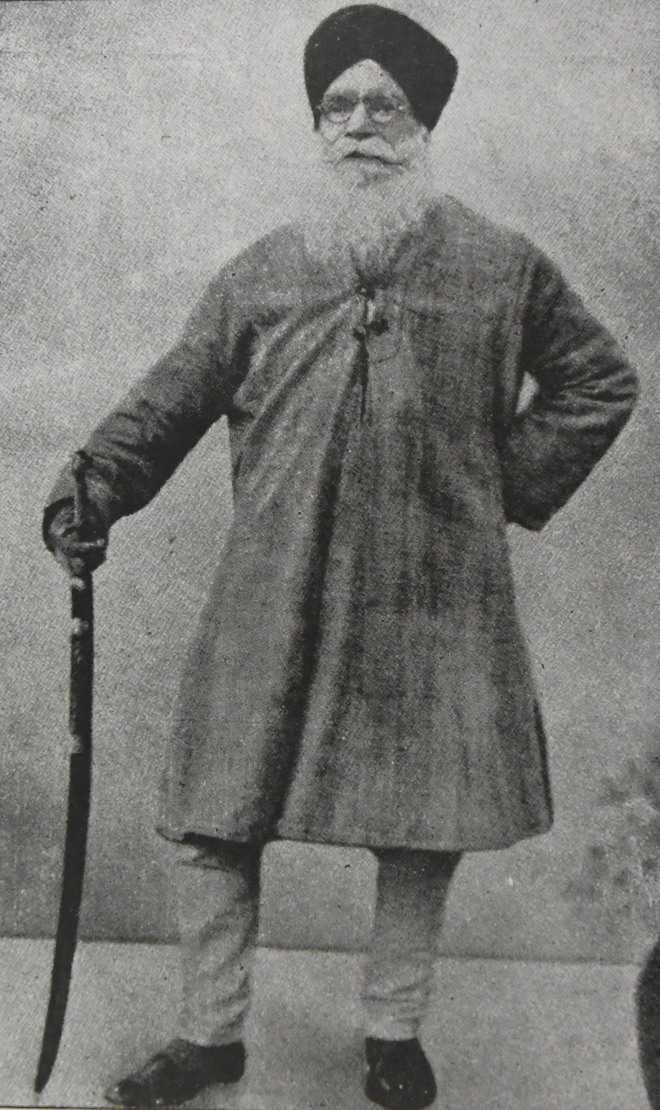Vishav Bharti
Tribune News Service
Chandigarh, June 6
The British had banned Gandhi caps and black turbans inside jails. When Baba Kharak Singh, who was lodged in the Dera Ghazi Khan jail (in North West Frontier) was asked to remove his turban, he threw away all his clothes, saying: “I will not wear these till the government lifts the ban.”
The chill could have killed the man, who was in his mid-fifties. To cajole him, jail officials lifted the ban on black turban and top Congress leadership requested him to put on his clothes, but Baba Kharak Singh refused to do so. After five-and-a-half years on June 4, 1927, he walked out of the jail in ‘kachera’ (shorts).
Kharak Singh was a top Congress leader who after Lala Lajpat Rai’s arrest became the president of the Punjab Provincial Congress Committee in 1922.
However, the Congress government didn’t feel the need to celebrate his 150th birthday on Wednesday. Akalis, on the other hand, did try to make up for it by giving advertisements in newspapers as he was one of the founders of the SGPC too and had served as its president in 1922.
Present day rulers may have completely forgotten him, but Prof Mohinder Singh, a historian, known for his seminal work on the Akali Movement, recalls that Nehru valued him so much that on his birthday, he would visit Baba ji’s house in Delhi with a bouquet and sweets.
He says: “During one of the visits, Baba ji was taking bath. Nehru didn’t leave the flowers and sweets with the family but preferred to wait till he came out”. He calls it unfortunate that such a landmark day went unnoticed. “I don’t think Congress and Akali leaders today have even heard his name.”
When contacted by The Tribune, president, Punjab Pradesh Congress Committee, Sunil Jakhar sounded unfamiliar with the name of the great freedom fighter.
“The party has the highest regard for each and every former president. If there is some lapse on our part, it will be taken care of in future,” he said.
His contemporaries often hailed him for bringing the Sikh community into the national fold and strengthening the “bond between the Sikhs and the Congress”. Not only the Congress, being one of the founders of the SGPC, he remained at the centre of Akali politics too till 1935, when he was replaced by Master Tara Singh.
Following his arrest during the Non-Cooperation Movement, Baba’s defiance in the Dera Ghazi Khan jail became a part of Punjab’s folklore.
Prof Mohinder Singh recounted those times in a monograph ‘Baba Kharak Singh and India’s Freedom Struggle’. “Since the ban on wearing Gandhi cap was not lifted by the government, Kharak Singh came out of the jail without a turban and clothes. He was taken in a huge procession on the streets of Amritsar. In Lahore, thousands of people thronged the streets to have his glance,” he wrote.
Abdul Ghaffar Khan, who was lodged with Kharak Singh in the jail recounts those days in his autobiography, ‘The Frontier Gandhi’: “Kharak Singh was a powerful man, firm and immoveable like a mountain. Nobody could order him. In spite of all the suffering, he never lost his courage and determination.”
Interestingly, Baba Kharak Singh always questioned traitors within the Sikh community. Following the Jallianwala Bagh Massacre in 1919, he was instrumental in the revolt against Chief Khalsa Diwan’s pro-British politics and formed the Central Sikh League to lead struggle against colonial rule. He famously announced: “In the fight for India’s freedom if you find a bullet in my back, do not cremate my body according the Sikh rites.”
In 1921, he launched the Chabian da morcha against the government for the return of keys of “Toshakhana” of Golden Temple. It was the victory of this struggle following which Mahatma Gandhi sent him a congratulatory telegram saying: “First decisive battle of India’s freedom won.” “Here, we had a man who could never be manipulated. If he wanted, he could have become anything,” says Prof Mohinder Singh.
The man and his life
June 6, 1868: Born in Sialkot
1889: Graduates from newly established Panjab University; he was in the first batch
1919: Forms the Central Sikh League
1920: Elected president of SGPC
1922: Becomes president of Punjab Provincial Congress Committee
1932: Arrested and remained in jail for 19 months
1947: Travels across Punjab to oppose the Partition
1953: Presented Abhinandan Granth by the then President Dr Rajendra Prasad
October 6, 1963: Passes away
Unlock Exclusive Insights with The Tribune Premium
Take your experience further with Premium access.
Thought-provoking Opinions, Expert Analysis, In-depth Insights and other Member Only Benefits
Already a Member? Sign In Now











